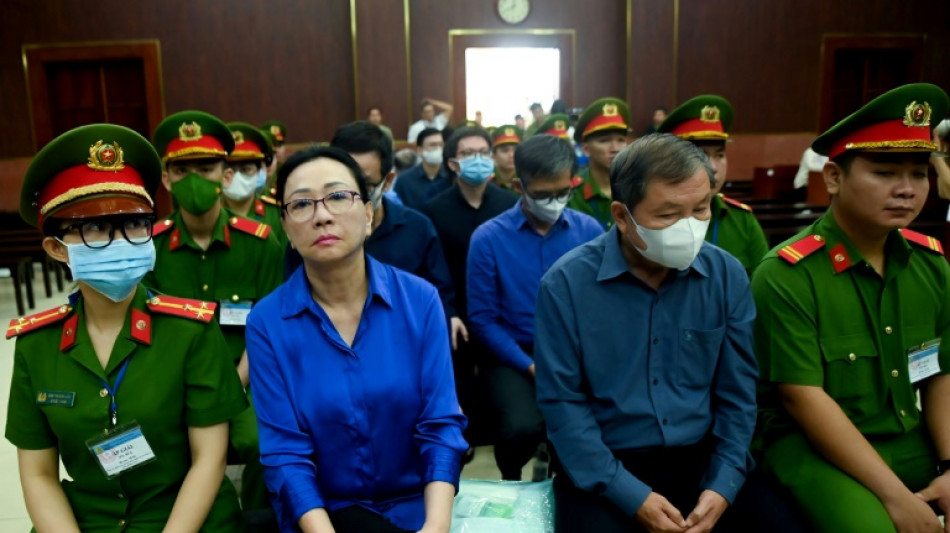
RBGPF
65.2700


A multi-billion-dollar fraud scandal involving one of Vietnam's most prominent tycoons exposed systemic weaknesses in the country's banking sector, say analysts who warn other such cases could yet emerge.
Judges on Tuesday upheld the death sentence of property developer Truong My Lan, who was convicted this year of embezzling vast sums from the Saigon Commercial Bank (SCB), which she controlled, having borrowed from tens of thousands of small investors.
Corruption is extensive in Vietnam, which ranked 83rd out of 180 in Transparency International's most recent Corruption Perception Index.
But the monumental scale of Lan's crime was unprecedented, with the $27 billion in losses prosecutors said she caused equivalent to Bosnia's entire annual gross domestic product.
Banking experts fear other damaging allegations are lurking in hidden recesses of the financial sector of the fast-growing economy, which is seen as a favoured destination for foreign investors looking for an alternative to China.
"SCB is not a single problem, it is an illness of the whole economy," banking expert Bui Kien Thanh told AFP.
The Vietnamese financial system was "characterised by a lack of tight state management", he said.
"Similar issues are rampant in society, so (Vietnam) needs to study and fix the problem before others arise."
Experts say a key systemic weakness is in the regulation of the corporate bond market, where companies borrow money from investors.
- Contemplating suicide -
In most developed markets, bonds are issued through independently regulated brokers on the basis of a full prospectus, graded by ratings agencies, and traded on stock exchanges.
But SCB, through its branches, misleadingly sold its bonds directly to retail customers, with staff trained for weeks on how to falsely reassure them their money was secure and the investment carried little risk.
Tens of thousands of people invested their savings in the bonds and lost everything when the bank collapsed and had to be bailed out by authorities, some of them contemplating suicide.
Most Vietnamese company debt is not rated for creditworthiness at all, with local ratings agency FiinRatings saying there were no corporate bonds with credit ratings in the country in the years before Lan's arrest.
That compared with an average of around 50 percent across the 10-member Association of South East Asian Nations (ASEAN).
According to state media, a judge at Lan's original trial asked police to look into the role played by staff at three of the world's biggest accounting firms that audited SCB's books -- Ernst & Young, Deloitte and KPMG.
None of the three responded to requests for comment by AFP.
At every level of the Vietnamese financial sector -- from employees on the ground to regulatory authorities -- there is a lack of training on financial markets, the risks involved and regulatory obligations, Thanh said.
On paper, Lan owned just five percent of shares in SCB, but at her trial, the court concluded that she effectively controlled more than 90 percent through family, friends and staff who were asked to hold stocks on her behalf.
- 'Can of worms' -
She then used her position to direct SCB management staff to withdraw money from the bank, over time transporting the equivalent of $4.4 billion in cash in trucks to her home and the offices of her Van Thinh Phat property firm.
"They don't question the paperwork... they just say, how are we going to do it? How fast can we do it?" said Khuong Huu Loc, an economist based in the United States.
"The whole system is a game based on collusion," he added. "The problem is, it gets so bad, (but) people let her continue on because you don't want to open the can of worms."
That comes on top of the corruption that is deeply embedded in the system -- one former chief inspector at the State Bank of Vietnam (SBV) was found guilty of accepting a $5 million bribe to overlook financial problems at SCB.
Since the scandal emerged, Vietnam has stepped up an anti-corruption drive.
But Carl Thayer, an emeritus professor at The University of New South Wales, warned foreign investors were concerned anti-graft efforts had "led to a chilling effect on the state bureaucracy and a slowing of procedures", with officials fearing taking any decision could lead to their motives being questioned.
Even so, he said the revelations from the case meant Vietnam "will have to take exceptional steps to audit the banking system effectively".
Even if there was nothing on the gargantuan scale of SCB waiting to be found, Loc said that "there could be a smaller version out there".
"The question is how many?"
T.Wu--ThChM